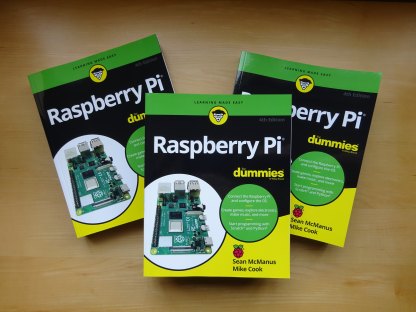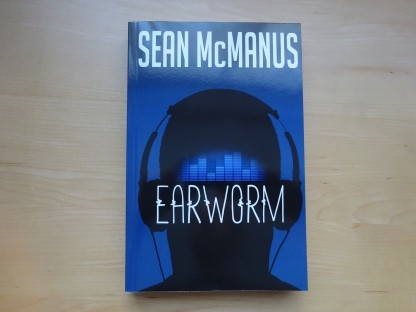
100 Top Tips: Microsoft Excel
Power up your Microsoft Excel skills with this powerful pocket-sized book of tips that will save you time and help you learn more from your spreadsheets.
29 July 2024
 Issue 144 of the MagPi is out now, including my cover feature on getting started with electronics and part two of my Productive Python series.
Issue 144 of the MagPi is out now, including my cover feature on getting started with electronics and part two of my Productive Python series.
If you're a Raspberry Pi user who's never dabbled with electronics, I hope my feature will give you the confidence to begin. It shows you how to wire up an LED safely and control it from Python. There is also a shopping list of useful components and a guide to follow-on projects you can find online to build your skills. The program in this article turns your LED into a Morse code transmitter. I've extended it slightly to take your text input and convert it into the flashing Morse code. The photo I've used to illustrate this on my site shows strips of paper with Morse code messages stamped into them. I photographed it at the Porthcurno Museum of Global Communications.
Last issue, part one of Productive Python looked at time travel experiments in Python, showing how to create clocks and calendars to help you manage your time. This issue, I shared two programs I've written to automate frequent tasks. The first Python program searches through PDFs (such as ebooks and magazine back issues). The other is a Python program to download web pages and put them into a Word document. The examples show you how to process files and web content, and how to save the output to text files and Word files. I hope these programs are useful starting points for readers as they think about other routine tasks they could delegate to Python.
If you encounter errors when trying to use pip install in an old tutorial (for example Raspberry Radio or ArtEvolver in my free Coding Compendium ebook), you need to set up a virtual environment. My latest Productive Python tutorial also walks you through the steps involved in doing this using Thonny. It's easy, but it's new, so I recommend you take a look if you haven't done it before.
The MagPi can be ordered or downloaded online and is available in newsagents, including WH Smiths.
Permanent link for this post | Blog Home | Website Home | Email feedback
12 July 2024
 For the latest issue of The MagPi, I've written a tutorial about creating new clocks and calendars with Python. I've been thinking recently about how Python can be used to improve your productivity, so for this article, I provided some examples of using the datetime module to represent time in useful and inspiring ways.
For the latest issue of The MagPi, I've written a tutorial about creating new clocks and calendars with Python. I've been thinking recently about how Python can be used to improve your productivity, so for this article, I provided some examples of using the datetime module to represent time in useful and inspiring ways.
The article includes a "hello world" example that tells you how many days it is to Christmas. It then shows you how to make a calendar like the one shown on the right, where a bar graph shows how much of the current day, month and year has passed. (Or remains, depending on whether you're a calendar-half-full or calendar-half-empty kind of person). If you're working on goals with a deadline of the current month or year, this can help you to see how much of your available time has already passed, and how much is left.
The second example is a countdown clock, made by wiring up a four-digit seven-segment display to the Raspberry Pi's GPIO pins. By setting this to the end of the work day, you can see how much time is left at any moment. This helps you to choose the biggest task next that will fit in the time available, or can inspire a mild panic to get you moving if you are on an end-of-day deadline that's closing in too fast. With magazine listings, the idea is to keep the code simple. One enhancement I thought of, but didn't include, was for the clock to have different finishing times on different days, because some days I finish at different times to others.
You can download the code for these examples here, and can find issue 143 of The MagPi online or in your newsagent.
You might also be interested in my pomodoro timer for the micro:bit, which also features in my free Coding Compendium ebook.
Issue 143 of The MagPi also includes an article I wrote about Spin, a DJ deck that plays AI-generated music. You use buttons to choose the parameters you want for generating the music and can scratch it using a real record deck.
Permanent link for this post | Blog Home | Website Home | Email feedback
© Sean McManus. All rights reserved.
Visit www.sean.co.uk for free chapters from Sean's coding books (including Mission Python, Scratch Programming in Easy Steps and Coder Academy) and more!

Power up your Microsoft Excel skills with this powerful pocket-sized book of tips that will save you time and help you learn more from your spreadsheets.

This book, now fully updated for Scratch 3, will take you from the basics of the Scratch language into the depths of its more advanced features. A great way to start programming.

Code a space adventure game in this Python programming book published by No Starch Press.

Discover how to make 3D games, create mazes, build a drum machine, make a game with cartoon animals and more!

Set up your Raspberry Pi, then learn how to use the Linux command line, Scratch, Python, Sonic Pi, Minecraft and electronics projects with it.

In this entertaining techno-thriller, Sean McManus takes a slice through the music industry: from the boardroom to the stage; from the studio to the record fair.